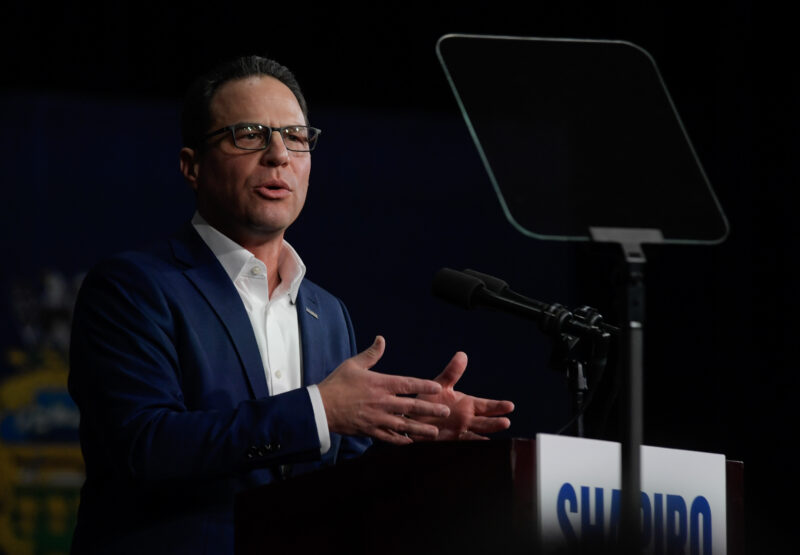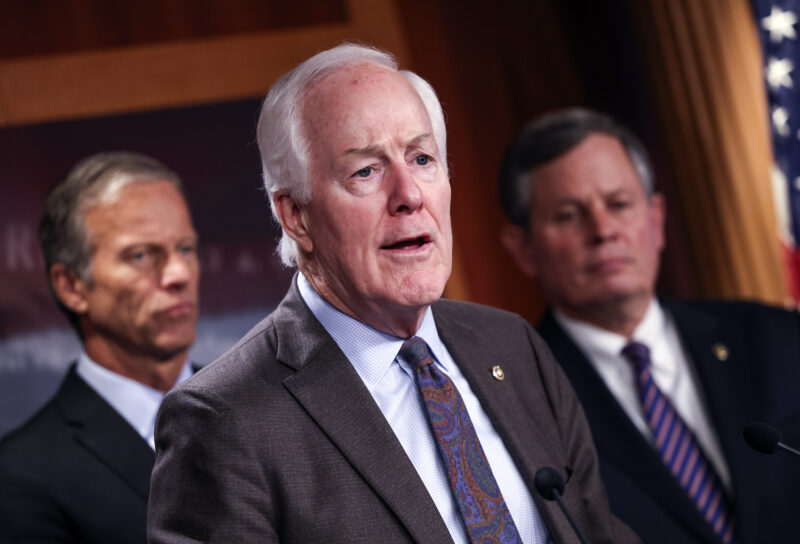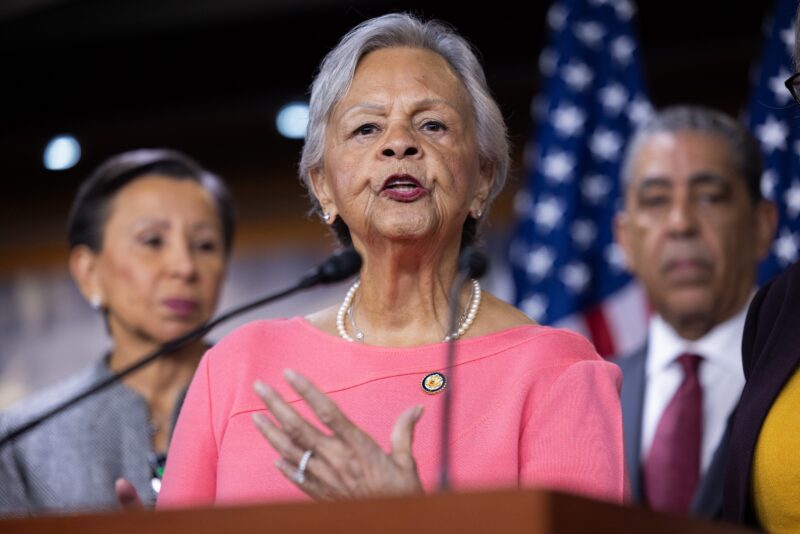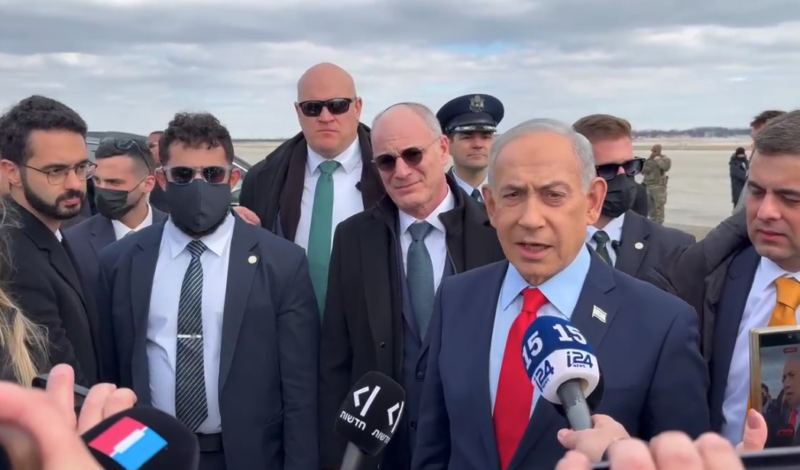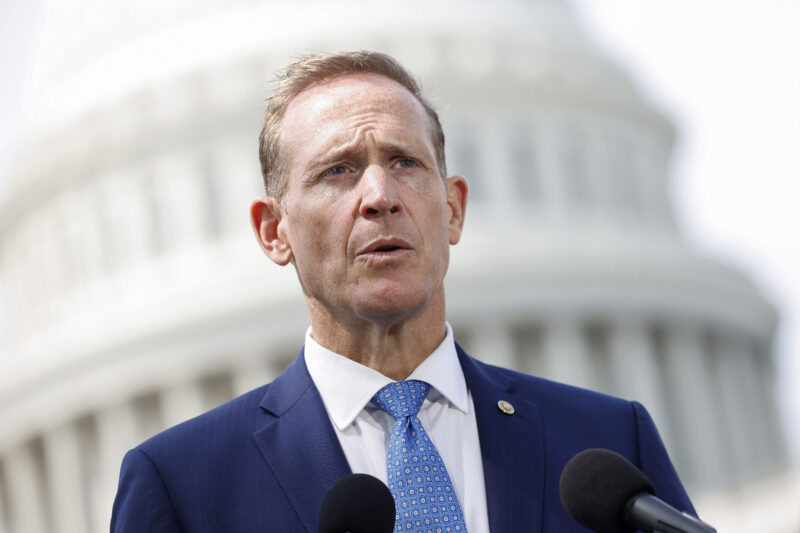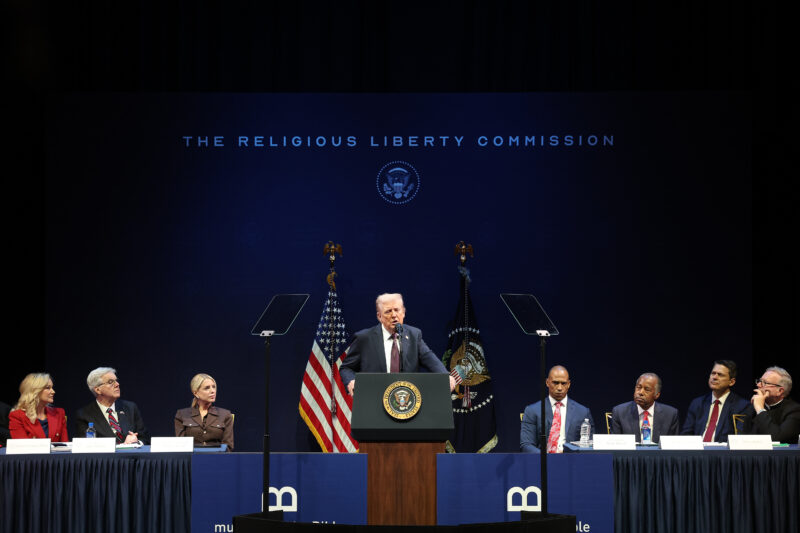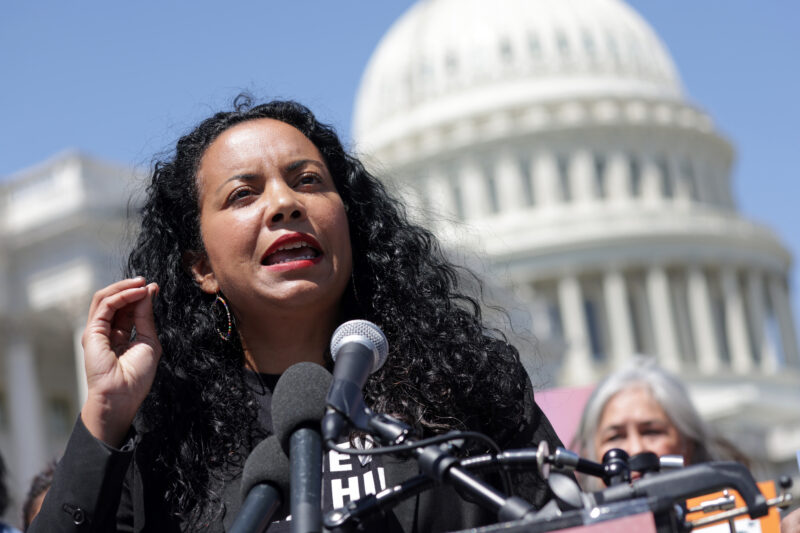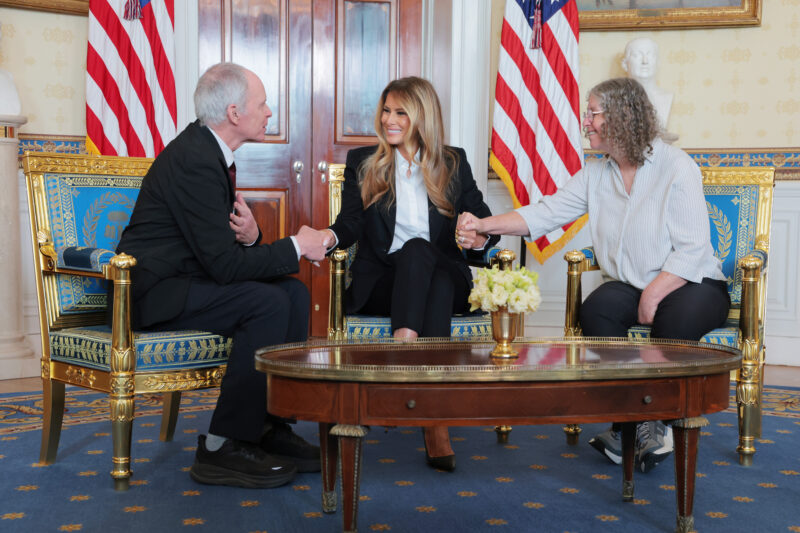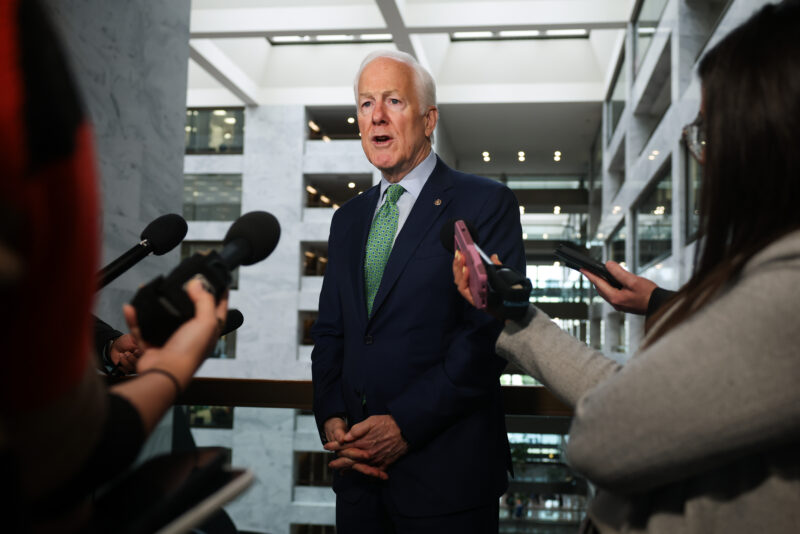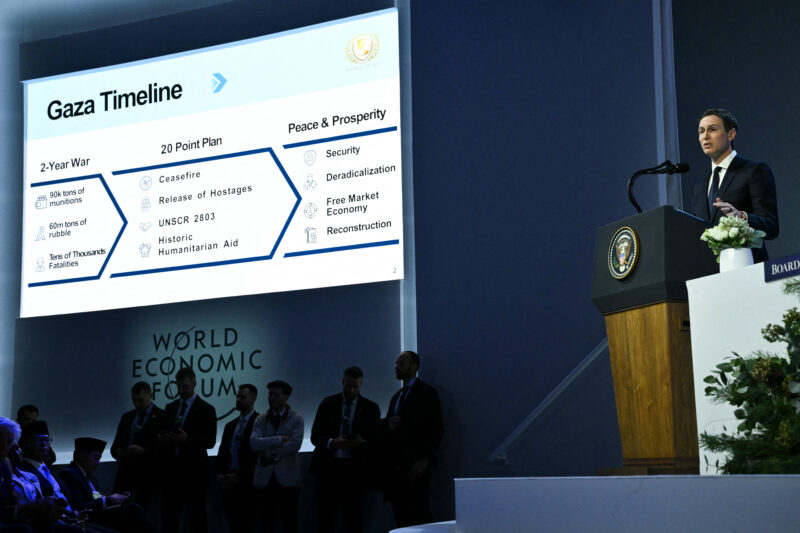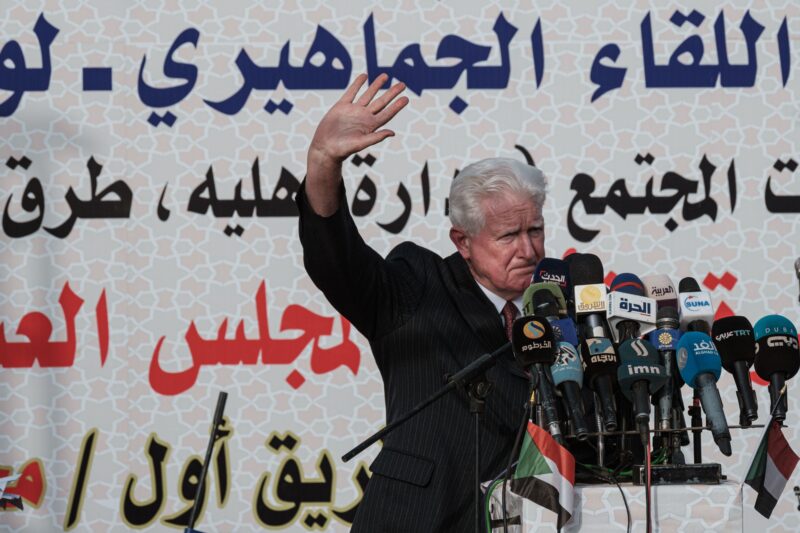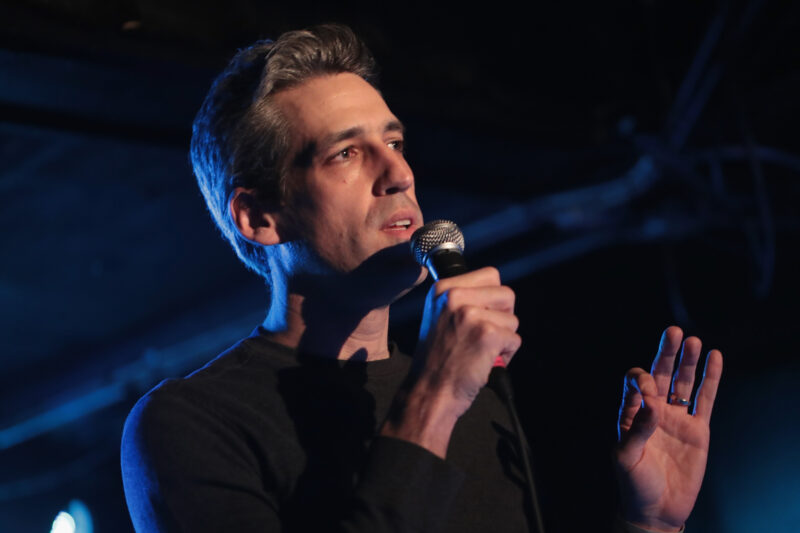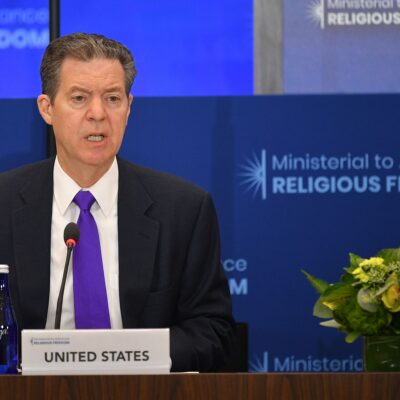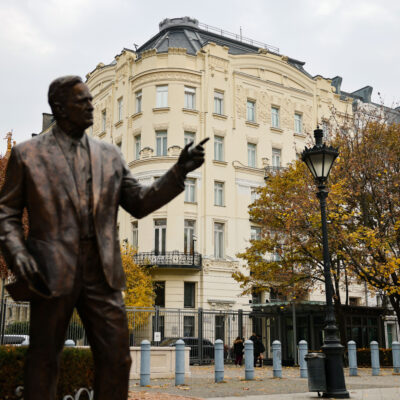Israeli war cabinet dissolved after Gantz resignation
Netanyahu will still be able to make decisions outside of forum including Smotrich, Ben-Gvir, but the aftershocks of the departure of the coalition’s centrist counterbalance were felt immediately in cabinet meetings

MENAHEM KAHANA/AFP via Getty Images
Israeli Prime Minister Benjamin Netanyahu speaks during a ceremony marking Holocaust Remembrance Day at the Yad Vashem Holocaust Memorial in Jerusalem on May 5, 2024.
Israeli Prime Minister Benjamin Netanyahu informed members of his security cabinet on Monday that he had dissolved the country’s war cabinet after eight months.
“There is no more war cabinet,” Netanyahu said, according to a source in the security cabinet. “It was part of the coalition agreement with [former minister Benny] Gantz, at his demand. The moment Gantz left, there is no such forum anymore.”
Gantz and his National Union party resigned last week from the coalition, which it joined shortly after Hamas’ Oct. 7 attack on Israel. In their departures, Gantz and then-minister Gadi Eisenkot, a war cabinet observer, cited disagreements with Netanyahu about his handling of the war, hostage negotiations and other issues.
The war cabinet was established as a smaller forum than the security cabinet, which is in turn smaller than the full cabinet. The war cabinet excluded Finance Minister Bezalel Smotrich and National Security Minister Itamar Ben-Gvir, both of whom are to Netanyahu’s right.
The forum’s dissolution is unlikely to have any real impact, since Gantz and Eisencot were no longer members. Netanyahu noted in the security cabinet meeting that he will still be able to hold consultations with the remaining members — Defense Minister Yoav Gallant and observers Strategic Affairs Minister Ron Dermer and Shas leader Aryeh Deri — and he can make decisions about the war with Gallant. That would still leave Ben Gvir and Smotrich out, despite their demands to join the war cabinet.
But Gantz’s departure, which took effect on Thursday, means there is no counterbalance to Netanyahu’s left in the coalition and gives Netanyahu less political and diplomatic cover to say that Israel’s maneuvers have support from both sides of the aisle.
The Netanyahu-led coalition still has 64 seats out of 120, such that an election is not necessarily imminent, but the aftershocks of Gantz’s departure have been immediate.
Under pressure from ministers in his newly narrow coalition on Sunday, Netanyahu rapped an announced pause in the IDF’s fighting in Rafah to deliver humanitarian aid as “unacceptable.”
The IDF and Coordinator of Government Activities in the Territories (COGAT), which handles humanitarian aid, said that they are working “to increase the volume of humanitarian aid entering the Gaza strip … following additional related discussions with the UN and international organizations.”
Beginning on Saturday, the statement read, the IDF planned to take a “local, tactical pause” from 8 a.m. to 7 p.m. each day along a road from the Kerem Shalom crossing to allow aid to be transferred north.
A diplomatic source said that “when the prime minister heard the reports in the morning about a humanitarian break for 11 hours a day, he contacted his military secretary to say that this is unacceptable.”
“Following clarifications, it was reported to the prime minister that there is no change in the IDF’s policy and fighting in Rafah is continuing as planned,” the source stated.
The IDF Spokesperson’s Office clarified that “there is no stop to the fighting in the southern strip and fighting in Rafah continues. In addition, there is no change in the entry of goods into the strip. The road [for delivering] the goods will remain open during the day in coordination with international organizations for the movement of humanitarian aid only.”
An IDF source said that the “tactical pause” announcement came following instructions from the government – as opposed to within the military – to allow more aid into Gaza and to make the move public, Army Radio reported on Monday.
Netanyahu’s negative response to what were essentially his own instructions came after Ben-Gvir said that “whoever decided to have a ‘tactical pause’ for a special humanitarian [aid] transfer while the best of our soldiers are falling in battle is evil and foolish and must not stay in his job.”
“Unfortunately, this move was not brought before the security cabinet and goes against its decisions,” Ben-Gvir added. “The time has come … to stop the crazy and delusional approach that only brings more deaths.”
Smotrich called the humanitarian pause plan “delusional,” while noting that it did not reflect any actual change, as international organizations could deliver aid along that road. Yet, he said, “humanitarian aid continuing to reach Hamas keeps it in power and makes [Israel’s] achievements in the war go down the drain.”
The debate over increased aid into Gaza comes amid other governmental disagreements over military strategy. On Sunday, the Knesset’s Ministerial Committee for Legislation advanced a three-month extension to a temporary law that raised the age at which soldiers are released from IDF reserve duty by one year, from 40 to 41 for soldiers and 45 to 46 for officers. The Defense Ministry said in requesting the extension that it does not want to have to release thousands of soldiers in the middle of a war because they turned 40.
The ministerial vote took place within a day of the IDF’s announcement of 11 soldiers killed in action over the weekend. It also came at a time of heated public debate over the exemption for Haredim from serving in the IDF. On Monday, the Knesset voted on a bill that would set Haredi enlistment targets that were so low that they would have no effect on the number of Haredim in the IDF this year. The lack of serious conscription reform was among the reasons that Gantz took his party out of the coalition, and the former minister posted that “we cannot blur the connection between the fallen, the injured and the courage of all of our fighters and the fact that Israel’s security requires us to recruit more soldiers from all parts of society. It’s not just a matter of national fairness, but a security need.”
Without Gantz’s party and the agreement struck when the emergency government was formed, the coalition is no longer limited to only advancing legislation that is related to the war. In addition, Netanyahu’s four remaining coalition partners are all religious parties to varying degrees, leaving Likud as the only nominally secular party. As such, the Knesset Law, Constitution and Justice Committee, led by Simcha Rothman of the Religious Zionist party, scheduled a meeting this week to advance a bill giving the Religious Services Ministry and Chief Rabbinate, as opposed to local government, greater influence in appointing municipal rabbis. This would effectively remove all women from the decision-making process and allow the Shas party to make the appointments. Gantz blocked the bill earlier this year because it is unrelated to the war, and his party said on Sunday that “Netanyahu and his coalition are proving again that for them, politics are above everything, as long as he survives.”
Please log in if you already have a subscription, or subscribe to access the latest updates.





